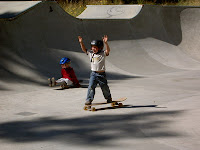
Over-protective parents are warned today that they are denying youngsters a proper childhood by keeping them indoors playing video games instead of letting them outside to play. A group of almost 300 teachers, psychologists, authors and childcare experts claim the loss of unstructured play is threatening the health and well-being of a generation.
They say that loosely supervised fun is crucial for keeping children active, teaching them to deal with risk and learn to get on with others. But parental anxiety over "stranger danger" is conspiring with high volumes of traffic, aggressive marketing of commercialised toys and screen entertainment to rob children of opportunities to enjoy traditional play.
The warning comes in an open letter signed by, among others, children's author Philip Pullman, childcare expert Dr Penelope Leach and Baroness Susan Greenfield, director of the Royal Institution.
The signatories also include 60 psychologists and psychotherapists, more than 40 university professors, plus leaders of teaching unions and children's charities.
A similar letter a year ago voiced fears that childhood was being "poisoned" by a damaging mix of junk food, all-day TV and violent computer games.
That warning, backed by the Archbishop of Canterbury, sparked a national inquiry on the state of childhood which is due to report next year. In the latest letter, experts warn that the loss of opportunities for play is a major factor in the rise of mental health and behavioural problems in recent years. They say research has deepened concern that youngsters are facing a mental health crisis.
They point to the finding by Unicef that Britain's children are among the unhappiest in the developed world, adding: "We believe that a key factor in this disturbing trend is the marked decline over the last 15 years in children's play."
The letter goes on to insist that play, particularly outdoors, is vital to children's all-round health and well-being. The letter was organised by writer Sue Palmer, whose book Toxic Childhood sparked a national debate on the issue, and Dr Richard House, a senior lecturer in psychotherapy at Roehampton University.
"Real play - socially interactive, first-hand, loosely supervised - has always been a vital part of children's development, and its loss could have serious implications," they said.
"Just as the epidemic of childhood obesity recently took the developed world by surprise, too much 'junk play' could - like too much junk food - have alarming implications for the next generation.
"We hope this letter helps draw attention to the importance of giving the next generation time, space and encouragement to go 'out to play'."
Mrs Palmer added: "We have become over-protective in certain ways and letting go is one of the hardest things.
"But there is a limit to the extent we can protect children physically - they have to become capable of protecting themselves as well."
They say that loosely supervised fun is crucial for keeping children active, teaching them to deal with risk and learn to get on with others. But parental anxiety over "stranger danger" is conspiring with high volumes of traffic, aggressive marketing of commercialised toys and screen entertainment to rob children of opportunities to enjoy traditional play.
The warning comes in an open letter signed by, among others, children's author Philip Pullman, childcare expert Dr Penelope Leach and Baroness Susan Greenfield, director of the Royal Institution.
The signatories also include 60 psychologists and psychotherapists, more than 40 university professors, plus leaders of teaching unions and children's charities.
A similar letter a year ago voiced fears that childhood was being "poisoned" by a damaging mix of junk food, all-day TV and violent computer games.
That warning, backed by the Archbishop of Canterbury, sparked a national inquiry on the state of childhood which is due to report next year. In the latest letter, experts warn that the loss of opportunities for play is a major factor in the rise of mental health and behavioural problems in recent years. They say research has deepened concern that youngsters are facing a mental health crisis.
They point to the finding by Unicef that Britain's children are among the unhappiest in the developed world, adding: "We believe that a key factor in this disturbing trend is the marked decline over the last 15 years in children's play."
The letter goes on to insist that play, particularly outdoors, is vital to children's all-round health and well-being. The letter was organised by writer Sue Palmer, whose book Toxic Childhood sparked a national debate on the issue, and Dr Richard House, a senior lecturer in psychotherapy at Roehampton University.
"Real play - socially interactive, first-hand, loosely supervised - has always been a vital part of children's development, and its loss could have serious implications," they said.
"Just as the epidemic of childhood obesity recently took the developed world by surprise, too much 'junk play' could - like too much junk food - have alarming implications for the next generation.
"We hope this letter helps draw attention to the importance of giving the next generation time, space and encouragement to go 'out to play'."
Mrs Palmer added: "We have become over-protective in certain ways and letting go is one of the hardest things.
"But there is a limit to the extent we can protect children physically - they have to become capable of protecting themselves as well."
Original Source: Daily Mail, By Laura Clark




No comments:
Post a Comment